Thanks to the people who have contributed to this week’s newsletter: Ann Stanley, Jenna T., Leila Alexandra and Robin Gale-Baker.
More leeks and celeries to give away
Thanks to Alicia, Amanda, Anna, Carol, Chris, Christina, Felicity, Heather, Judy, June, Karen, Mardi, Niloo, Soo Mei, Tania, Vicki, Vicky, Virginia and Yuki for collecting some of our leek and celery seedlings.
But we still have a lot more leek and celery seedlings to give away! The leeks are variety Oxford and the celeries are variety Julius. Pick up from my home in Eltham. If you want some, simply email me to arrange a date. First come, first served.
Air fryers versus ovens
Despite their name, air fryers bake their food rather than frying it. In effect, they are simply small fan-forced ovens. The key difference between air fryers and ovens is simply size.
Because of their smaller size, air fryers typically take less time to heat the air and also have more rapid air flow. This, in turn, means that they typically cook faster than fan-forced ovens, say 25-50% faster. Furthermore, the use of a basket in which the food is placed, helps air flow and thus evenness of the cooking. They also use less energy, occupy less space and heat up the kitchen less.
Because of their larger size, ovens can cook multiple dishes at the same time. They can also cook in ways other than fan-forced and are therefore more flexible.
Finally, you will almost definitely already have an oven but may well not (yet) have an air fryer.
Read more of my baking articles.
Growing mustard greens or mizuna (by Robin Gale-Baker)
Want a leafy green to add to your salad which has a peppery bite (but is a bit milder than rocket) and that you can grow all year round? If so, try either mustard greens or mizuna (they taste similar). There are lots of varieties of mustard greens and, whilst they mostly taste similar, their leaves (and therefore both texture and mouth feel) vary substantially, from the large-leaved ‘Red Giant’ to the thin, frilly-leaved ‘Golden Frills’.
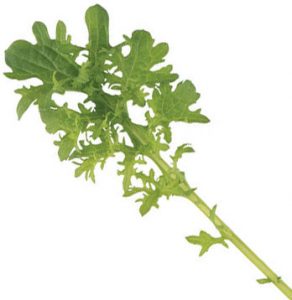 |
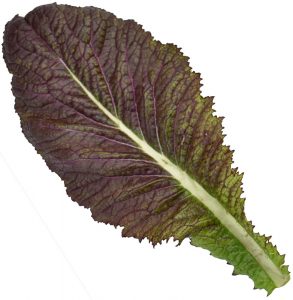 |
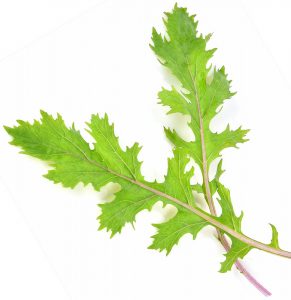 |
| Mustard greens ‘golden frills’ | Mustard greens ‘red giant’ | Mizuna |
While some mustard greens are widely used (especially in Asian cuisine), most are not well known in Australia. This is a pity as they are healthy, tasty, quick growing, and definitely best when harvested fresh from the garden. Just as mustard has quite a bite, so do the leaves of mustard greens. They are great for salads when young, and good in stir fries when a bit older.
Edible mustard greens are members of the genus Brassica, and more specifically from the species Brassica juncea and Brassica rapa. As such, they are related to cauliflower, cabbage and broccoli, all of which are Brassica oleracea.
You can buy their seeds at most online seed websites and/or you can buy their seedlings at many nurseries.
Varieties of Brassica juncea
These include Japanese Giant Red Mustard or Mustard ‘Red Giant’, Frills (golden, purple or scarlet), Mizuna (both green and purple), Green Wave, Wasabina, Curled Mustard, Southern Giant, Golden Streaks, Osaka Purple, Gai Choi, Tender Green and Yukina Savoy.
The Tatsoi variety (sometimes classified as Brassica rapa) has less of a peppery taste but looks beautiful whilst growing.
Varieties of Brassica rapa
These include Mustard Spinach Komatsuna, Tokyo Bekana and Japanese Mibuna.
The Pak Choi, Bok Choy and Napa Cabbage varieties have less of a peppery taste but are widely used in stir fries.
Other mustards
There are two other main types of mustard.
Black mustard (Brassica nigra), brown mustard (a variety of Brassica juncea) and white mustard (Sinapis alba) are all grown for their seeds, which are used to make mustard.
Mustard biofumigant (a variety of Brassica napus) is a non-edible type of mustard grown as a soil fumigant. This plant releases compounds that attack soil-borne diseases and disinfects the soil. It is a long-term crop, meaning that it needs to grow for, say, 5 months and then be dug back into the bed.
Site and soil
Choose a sunny site or area of partial sun depending on the season. The soil should be well drained and contain plenty of organic matter. The soil should not dry out and should be kept weed-free.
Planting
Sow the seed directly into the soil at a depth of about 5cm. I prefer to broadcast the seed across the soil and then cover. Grow plants tightly together (rather than plant in rows) as this deters pests from eating the leaves. Germination takes 7-14 days.
You can plant mustard greens or mizuna at any time of year noting that, like other leafy greens, they tend to bolt early if grown over summer.
Pests
Pests include caterpillars, slugs, snails and earwigs. Use a deterrent for caterpillars, slugs and snails. For earwigs, put some stakes in the bed and place a down-turned pot stuffed with newspaper on top of the stake. The earwigs will head for the pot of newspaper and you can remove the pot daily or every few days and dispose of the paper and earwigs. Netting them is another option, but secure the hem to the ground to keep crawling pests out. Netting also prevents white cabbage butterflies laying eggs on the leaves, preventing the hatched caterpillars from stripping the juicy leaves, leaving only the ribs and veins.
Harvesting
Snip most leaves for use when they are 10-15cm high. They will still be tender at this height. You can also grow them as microgreens, snipping them when they are about 3cm high.
Read more articles by Robin on how to grow various vegetables.
An interview with Jules Jay from the Hurstbridge Edible Hub (by Ann Stanley)
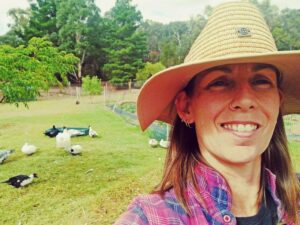 I (Ann) recently took my surplus eggs and tomatoes to the food swap at the Hurstbridge Edible Hub and came home with cucumbers, passata and some garlic cloves to re-plant. I got the garlic cloves from pop-up garlic farmer, Vicky-Rae Elmore, along with some advice about when best to plant them.
I (Ann) recently took my surplus eggs and tomatoes to the food swap at the Hurstbridge Edible Hub and came home with cucumbers, passata and some garlic cloves to re-plant. I got the garlic cloves from pop-up garlic farmer, Vicky-Rae Elmore, along with some advice about when best to plant them.
While I was there, I had a chat with community organiser Jules Jay, whose energy, enthusiasm and expertise help to keep the Edible Hub a positive and vibrant place.
Why the name ‘Edible Hub?
As well as the twice a month food swap, there is the community garden which is a true community food-growing garden where anyone can pick anything at any time. There’s also a drop off point for free food, where community members can collect some goods that 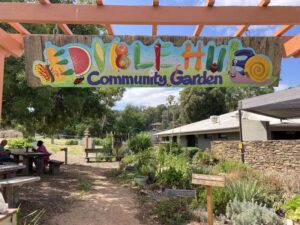 supermarkets would otherwise discard.
supermarkets would otherwise discard.
How did it all start?
Following the renovation of the Hurstbridge Community Hub at Graysharps Road in 2016, Tracy Bjorksten, Sabi Buehler and Pam Jenkins decided to rejuvenate and cultivate six wicking beds that had been established at the site then more or less abandoned. Jules joined them soon after and it grew from there.
(Sometimes, when councils are reluctant to approve a community garden, it is because they know that the initial enthusiasm is not always enough to fuel the project to the extent required for its ongoing viability.)
Tracy has now moved away from the area but Sabi, Pam and Jules, plus new participants Val, Leanne and Gala, meet every Thursday morning at 9.30, garden until 11, then sit for an hour or so chatting over tea and cake.
As a team, they also collaborate with other groups such as the local Social Connections Group in which older people from rural areas fold seed packets for the seed library.
The area seems to be well used
The success of the Edible Hub is about having multiple attractions, such as the tables that people use for lunch and the fairy tree that children come with their parents or grandparents to look at. There are the usual vegetable beds plus a small sensory garden with paths to wander along and plants to touch, see and smell. They have fruit trees, a book exchange, and community ‘share shelves’, where everyday items are shared and swapped, and a seed library.
What motivates you to be such a committed connector of people?
“I am an environmentalist at heart but I also have a Masters in Positive Psychology. Positive psychology attracted me because, when it comes to social and behaviour change, particularly in relation to the environmental challenges we face, I don’t find the ‘fear and threat’ approach useful. I prefer to ask, ‘what strengths do we have right here and where can we find hope?’ And I love working with the community.“
Do you think the grassroots level is the best place to seed social and behaviour change?
“Yes. Because of the ‘glacial’ pace of the higher levels of government, the most fertile opportunities for change are at the grassroots level. But local councils have a huge role to play facilitating community initiatives with grants. It’s not the job of local government to come up with ideas but to facilitate the good ideas of local people. I have only praise for the ways that the Nillumbik Shire does this. Talking to the right person is key.“
As well as convening the community garden, Jules co-runs the Nillumbik Repair Cafe, which helps people connect with each over reducing the mindless waste of objects that can be repaired or re-purposed by those with the skills and generosity to do so.
Read more about the Hurstbridge Edible Hub, including contact details.
Read more interviews with local community garden convenors.
If you would like Ann to visit your community garden and then write something for this newsletter, send us an email.
What seeds to plant in April
Here is a list (see the planting guide for more detail):
BrassicasKale |
Cool season veggiesBroad beans |
Leafy greensLettuce |
OtherBeetroot |
If you didn’t plant your cool season veggies in March, April is a good month. So, plant those broad beans, peas and garlic. Also, plant some leafy greens. It’s a bit late for planting broccoli, cabbage and cauliflower seeds but, as they say, better late than never.
Read Robin Gale-Baker’s 2020 articles on growing broad beans and garlic.
Read Helen Simpson’s 2016 articles on growing garlic. Also, autumn plantings more generally.
The Melbourne ‘Local Food Connections’ community radio show
On next Sunday’s show (31st March), Ann Stanley will interview Rob Rees from Cultivating Community. Listen on 3CR (855 AM), 10-10.30am, by tuning into either the station (855 AM) or its livestream.
Podcasts of all previous episodes are available on their website, the latest being Fleur Baker on taking permaculture to the mainstream (17th March).
Our articles over the last month
Here are some of the articles from our newsletters over the last month that you might have missed:
- Box Hill Community Gardens.
- Creative veggie peel stock (by Ellie McSheedy).
- How to make mead.
- Jolimont Community Garden in Forest Hill.
- Naught Distilling.
- Slater Community Garden in Blackburn North.
- Sugar: brown vs white vs caster vs icing vs raw.
- Sweet appleberry (Billardiera cymosa) by Melbourne Bushfood.
Which link was clicked most times in the last newsletter?
The most popular link in the last newsletter was the website of the hazelnut farm, Burnarlook.
The most popular event link in the last newsletter was the Doncaster Garden Club.
This week’s moment of humour
Newsletter reader Jenna T. has suggested that I change the title of this section from joke (or pun) of the week to this week’s moment of humour. I’ve decided to put it to a vote of the readership. So:
- Vote to change the title to this week’s moment of humour.
- Vote to keep the title as joke (or pun) of the week.
In the meantime, the photo right is of an eggplant and this week’s written moment of humour is below.
A cabbage, a tap and a tomato had a race.
The lettuce was a head, the faucet was still running and the tomato was trying to ketchup.
Regular activities over the coming week
Farmers’ and other food markets
- Thursday: The Food Collective Market, Epping.
- Friday: Farm Raiser farmgate (Bellfield) and Community Grocer, Carlton.
- Saturday: Carlton, Coburg and Farm Raiser farmgate (Bellfield).
- Sunday: Alphington and Eltham.
- Tuesday: Community Grocer, Fitzroy.
Food swaps
- Saturday: Brunswick East.
- Sunday: zip.
Community gardens
- Thursday: Buna (Heidelberg West), Diamond Valley Library (Greensborough), Edible Hub (Hurstbridge), Fawkner Food Bowls – children (need tickets), SEEDs (Brunswick) and Whittlesea.
- Friday: West Brunswick.
- Saturday: Links (Lalor), Macleod and Thrive (Diamond Creek).
- Sunday: Fawkner Food Bowls, Pentridge (Coburg) and Regent (Reservoir).
- Monday: Macleod, Panton Hill, SEEDs (Brunswick) and Whittlesea.
- Tuesday: Watsonia.
- Next Wednesday: Eltham Neighbourhood House, Macleod, Newton Street (Reservoir), Span (Thornbury) and Sylvester Hive (Preston) .
What’s the buzz about bees; Wednesday, 10th April, 10-11am; free; Croydon.
Claire will explain the benefits of beekeeping for you, the bees and the environment. She will explain some of the equipment required, the best position for the hive, the most beneficial plants to have in your garden and maintenance.
Introduction to horticulture and garden design (10 sessions); on consecutive Wednesdays, starting 24th April, 9.30-11.30am; free; Pascoe Vale.
This course will cover: site assessment; garden design and biodiverse establishment; prioritising food and medicinal plants; ecosystem dynamics; soil health; plant care and propagation; pest control; crop rotation; companion planting; pollination; efficient irrigation; and composting. Presenter: Leila Alexandra. Organised by Sussex Neighbourhood House.
Essential crop rotation and succession planting (part 1); Wednesday, 1st May, 7-9pm; free; Doncaster.
Duncan Cocking, from Leaf, Root and Fruit, will discuss: the patterns that he sees in nature and how you can begin observing them too; the seasons of Melbourne; phenology; timing of planting and succession planting; and growing Christmas tomatoes. The presentation will start at 7pm but there will be sandwiches and a food swap at 6.45pm.
Urban wine walk; Saturday, 4th May, midday-4pm; $82; Brunswick.
This is a self-guided wine tasting experience, where you choose the order in which you visit the various venues. The ticket includes complementary tastings, a $10 food voucher, a $25 voucher for wine orders and a tasting glass. The participating venues and winemakers: Bar Spontana with Fin Wines; Amelia Shaw with Musical Folk Wines; Co-Conspirator’s Brewing Co with Unico Zelo; Hotel Railway with Bobar Wines; Inner North Brewing Co with Wilkie Wines; Joey Smalls with Yugen Wines; The Penny Black with La Kooki Wines; Tino with Russel & Suitor Wines; and Welcome to Brunswick with Glenhope Vineyard.
Tea around the world; Thursday, 16th May, 7-9pm; free; Preston.
Sample tea from Indonesia, Morocco and Turkey with the Islamic Museum of Australia.
Beginners backyard beekeeping; Sunday, 19th May, 10am-3pm; $220 ($44 per hour); CERES.
Learn everything from the inner workings of a beehive to the healing properties of raw honey. You will learn how to maintain a healthy hive, discover the wonders of swarms and how to keep them in check. Weather permitting, they will also open a hive and have a hands-on demonstration. Presenter: Ashton Edgley.
Setting up a worm farm; Saturday, 25th May, 2-3.30pm; free; Edendale.
Learn how to set up a worm farm and the easiest methods to manage and care for these most hard-working of creatures. This workshop will cover both the theory and practice of worm farming in a household setting. It will be useful for those wishing to recycle household food waste in order to produce worm products for use in the improvement of soil in gardens and pot plants.
Traditional wooden spoon carving; Sunday, 26th May, 10am-4pm; $145 ($29 per hour); CERES.
Learn the traditional craft of carving your own kitchen utensils using specialised carving knives and your hands. From a piece of sustainably sourced native timber, carve spoons, butter spreaders, spatulas or spurtles from a piece of wood. You will learn: an age-old craft; the sense of meditation and slowness to be found in whittling life’s essential objects; sourcing sustainable materials; the basics of traditional tool use; and how to safely turn a log into your favourite wooden utensil. Presenter: Alma Arriaga.
Keeping backyard chickens with Felicity Gordon; Sunday, 26th May, 11am-midday; $15; Watsonia.
This workshop will cover all aspects of successfully keeping backyard chickens, including the benefits of keeping chooks, children & chooks, what breeds will suit you, chickens’ food & basic medical needs, chicken housing and how to keep them safe from foxes.
In March
- Grow your own mushrooms; Wednesday, 27th March, 6.30-8.30pm; $160 ($53 per hour); Collingwood.
In April
- Heritage apple tasting; Monday, 1st April, 3-5pm; $20; Templestowe.
- Introduction to beekeeping; Wednesday, 3rd April, 10.30-11.30am; $15; Edendale.
- Preserving the harvest; Wednesday, 3rd April, 7-9pm; free; Doncaster.
- Microgreens growing; Saturday, 6th April, 10am-midday; $80 ($40 per hour); CERES.
- Building healthy soils – cultivating fertility for veggie growing; Saturday, 6th April, 10am-1pm; $11; St Helena.
- Beginners backyard beekeeping; Saturday, 6th April, 10am-3pm; $220 ($44 per hour); CERES.
- Small space gardening; Saturday, 6th April, 10am-3pm; $115 ($23 per hour); CERES.
- The herbal apprentice (8 sessions); starting Saturday, 6th April, 10am-3pm; $995 ($21 per hour); CERES.
- SEEDs Communal Garden open garden; Saturday, 6th April, 10am-4.30pm; $8; Brunswick.
- The autumn harvest celebration day; Saturday, 6th April, 10am-5pm; free; Yarra Glen.
- Australian Distillers Festival; Saturday, 6th April, midday-7pm; $68; Abbotsford.
- Awara open garden; Saturday, 6th April, 2-3.15pm; $22 ($18 per hour); Pascoe Vale South.
- Edible weeds; Sunday, 7th April, 10am-midday; $70 ($35 per hour); CERES.
- Urban foraging 101; Sunday, 7th April, 10am-12.30pm; $90 ($36 per hour); Forest Hill.
- Australian Distillers Festival; Sunday, 7th April, midday-5pm; $68; Abbotsford.
- Farming for our future (ages 5 to 8); Tuesday, 9th April, 1-3pm; free; Brunswick East.
- What’s the buzz about bees; Wednesday, 10th April, 10-11am; free; Croydon.
- Toward zero waste (ages 5 to 8); Wednesday, 10th April, 10am-midday; free; Brunswick East.
- Kat Lavers on permaculture kitchen garden design; Wednesday, 10th April, 8-10pm; free; Doncaster East.
- Savvy tricks to make your food go the distance; Thursday, 11th April, 10-11.30am; free; Ringwood.
- Farm to fork (ages 3 to 5); Thursday, 11th April, 1-3pm; free; Brunswick East.
- Garden Festival; Sunday, 14th April, 10am-3pm; free; Fawkner.
- Urban food gardening (8 sessions); consecutive Thursdays starting 15th April, 10am-2.30pm; $80 for all 8 sessions (Government-subsidised fee); Edendale.
- Urban food gardening (10 sessions); on Wednesdays, starting 17th April, 9.30am-1.30pm; $50 ($1 per hour); Brunswick.
- Morris Whisky tasting and masterclass; Thursday, 18th April, 6.45-9.30pm; $54 ($20 per hour); Croydon.
- Coffee around the world with the Islamic Museum of Australia; Thursday, 18th April, 7-9pm; free; Preston.
- Milk carton printmaking; Saturday, 20th April, 10am-midday; $60 ($30 per hour); Forest Hill.
- Organic vegetable growing; Saturday, 20th April, 10am-3pm; $145 ($29 per hour); CERES.
- Composting workshop – from scraps to super soil; Saturday, 20th April, 10-11.30am; free; Bellfield.
- Autumn native plant sale; Saturday, 20th April, 10am-4pm; free; Eltham.
- Big Vegan Market; Saturday, 20th April, 10am-6pm; $9; Carlton.
- Big Vegan Market; Sunday, 21st April, 10am-6pm; $9; Carlton.
- Sustainable gardening (8 sessions); Tuesday, 23rd April, 10am-2pm; $650 ($20 per hour); CERES.
- Introduction to horticulture and garden design (10 sessions); on consecutive Wednesdays, starting 24th April, 9.30-11.30am; free; Pascoe Vale.
- Traditional wooden spoon carving; Saturday, 27th April, 10am-4pm; $145 ($29 per hour); CERES.
- Edible weeds walk; Saturday, 27th April, 10.30am-12.30pm; $30 ($15 per hour); Coburg.
- Foraging workshop; Saturday, 27th April, 1-3pm; $15; Ringwood.
- Edible weeds walk; Saturday, 27th April, 1.30-3.30pm; $30 ($15 per hour); Coburg.
- Home composting for beginners; Saturday, 27th April, 2-3.30pm; free; Edendale.
In May
- Essential crop rotation and succession planting (part 1); Wednesday, 1st May, 7-9pm; free; Doncaster.
- Introduction to horticulture and permaculture (15 sessions); starting Thursday, 2nd May, 10am-3pm; $1,050 ($14 per hour); CERES.
- Urban wine walk; Saturday, 4th May, midday-4pm; $82; Brunswick.
- Basic grafting; Sunday, 5th May, 10am-midday; free; Bundoora.
- Plants and permaculture; Sunday, 5th May, 10am-3pm; $145 ($29 per hour); CERES.
- Kalorama Chestnut Festival; Sunday, 5th May, 10am-4pm; free; Kalorama.
- Mushrooms growing; Sunday, 5th May, 10am-4pm; $195 ($33 per hour); CERES.
- Mushroom foraging; Wednesday, 8th May, 6.30-8.30pm; $85 ($43 per hour); Collingwood.
- Complete urban farmer (14 sessions); weekly sessions starting Friday, 10th May, 9am-3pm; $1,150 ($14 per hour); CERES.
- Introduction to food photography; Sunday, 12th May, 1.30-4.30pm; $119 ($40 per hour); Warrandyte.
- Tea around the world; Thursday, 16th May, 7-9pm; free; Preston.
- Seed saving 101; Saturday, 18th May, 10-11.30am; free; Bundoora.
- Beginners backyard beekeeping; Sunday, 19th May, 10am-3pm; $220 ($44 per hour); CERES.
Regular events
- Beekeeping workshop; roughly once a month on Saturdays, 1-4pm; $95 ($32 per hour); Brunswick East.
- Brewery tours; every Wednesday, Thursday and Friday, 3-4.30pm; $38 ($26 per hour); Abbotsford.
- Carlton aperitvio food tour; every Friday, 5-7pm; $139 ($70 per hour); Carlton.
- Cocktail making classes; various dates, times and costs; Richmond.
- Distillery tour and tasting; most Saturdays, 10.30am-2.30pm; around $30 ($8 per hour); Warrandyte South.
- Edible Forest tours; every Friday and Saturday, 11am-1pm and again at 1-3pm plus some other days of the week; $28 ($14 per hour); Dixons Creek.
- Eltham trails (walking food tour); various Saturday mornings and Thursday evenings; $65 ($22 per hour); Eltham.
- Flavours of Coburg food tour; 3rd Saturday of each month, 10am-1pm; $65 ($22 per hour); Coburg.
- Gin making masterclass; most Saturdays, 10am-1pm; $175 ($58 per hour); Nunawading.
- Plant to harvest; 1st Saturday of the month, midday-1pm; $5; Macleod.
- Gin masterclass; most Saturdays and Sundays, midday-1pm; $80 ($80 per hour); Eltham.
- Ratio Cocoa Roasters behind the scenes chocolate factory tour; various Fridays and Saturdays; $20 ($14 per hour); Brunswick.
- Spoon carving workshop; various Saturdays and Sundays, 10am-1pm; $130 ($43 per hour); Coburg North.
- Truffle workshop at Ratio Cocoa Roasters; 3rd Sunday of each month, 11am-1pm; $75 ($38 per hour); Brunswick.
- Wine tasting; 2nd Thursday of the month, 6-7.30pm; $33 ($22 per hour); Fitzroy.
- Wine tasting; various Saturdays and Sundays; $130; Fitzroy.
- Wine tasting; various Saturdays, 3-5pm; various prices; Northcote.
Upcoming face-to-face events – cooking
Vegetable fermentation workshop; Saturday, 20th April, 10am-1pm; $60 ($20 per hour); Bayswater North.
You will make your own sauerkraut and brine ferment. You will learn: the basics of gut health; the gut microbiome; the role of probiotics and fermentation in gut health; health benefits of fermentation; what is fermentation anyway; what are the different types of fermentation; how to make your own ferments using different techniques; fermentation rules; what vegetables to use; brining methods; what role salt and temperature play; what equipment to use; and jarring and storage. You will take home two different ferments that you make. Take 2 jars (approx 700mil) with lids, apron, rolling pin, non-breakable mixing bowl and a good mood. Presenter: Oddie. Organised by Arrabri Community House.
Natural soda workshop; Wednesday, 15th May, 6.30-8pm; $110 ($73 per hour); Collingwood.
Discover the goodness of fermented soda, brimming with probiotics, compared to traditional sugary options. Learn about the basics of fermented drinks. Make three soda flavours. Presenter: The Fermented Mumma.
Sourdough bread baking; Saturday, 25th May, 9am-5pm; $220 ($28 per hour); CERES.
You will: make a variety of different breads, gaining the skills and confidence to make your own at home; enjoy some of your own handmade pizza for lunch; and take home some leaven to get you started baking bread at home. Presenter: Ken Hercott.
Indian cooking; Saturday, 25th May, 10.30am-1pm; $65 ($26 per hour); Bayswater North.
You will make Indian butter chicken and basmati rice. You will enjoy some taste testing and should have some extra to take home too. Take an apron, knife, chopping board and a container to take home leftovers. Presenter: Oddie. Organised by Arrabri Community House.
Gluten-free kitchen skills; Sunday, 26th May, 10am-3pm; $150 ($30 per hour); CERES.
Be introduced to 20 different gluten-free flours, their texture, taste and how to use them. Then cook a collection of recipes. Presenter: Melanie Leeson from Mettle + Grace.
Cooking with bean curd; Sunday, 26th May, 11am-1pm; $28 ($14 per hour); Forest Hill.
Be guided through various recipes that showcase the different ways that you can cook with bean curd at home. Then take home the dishes that you created (take your own container). Organised by Strathdon House.
Yes chef! Cooking school for ages 14-18 (5 sessions); on 5 consecutive Mondays, starting 27th May, 4-5.30pm; $192 ($26 per hour); Brunswick East.
Each week will focus on different aspects of running a kitchen, like mise en place (French for “put in place”), safety and food hygiene, playing to our strengths (and the strengths of our team), how to work in a brigade, food storage, flavour profiles & ingredients and cleaning up. You will prep and cook a different meal each week, including lasagna, pie, cake and a roast dinner. Presenter: Cook Murph from Suntop Plaza. Organised by NECCHi.
In March
- Japanese fermentation; Wednesday, 27th March, 6.30-9pm; $120 ($48 per hour); Collingwood.
- Easter egg decorating; Thursday, 28th March, 6-8pm; free; Greensborough.
In April
- Sourdough basics; Wednesday, 3rd April, 6.30-8.30pm; $120 ($60 per hour); Collingwood.
- Mini master cooks – autumn fruits; Friday, 5th April, 10.30am-midday; $49 ($33 per hour); Forest Hill.
- Mini master cooks – colourful pasta; Friday, 5th April, 12.45-2.15pm; $49 ($33 per hour); Forest Hill.
- Feta, haloumi and mascarpone cheese making; Saturday, 6th April, 10am-4pm; $240 ($40 per hour); CERES.
- Indian cooking; Sunday, 7th April, 10am-3pm; $150 ($30 per hour); CERES.
- Pickling party and morning tea; Thursday, 11th April, 9.30-11am; free; Greensborough.
- Vegan chocolate making; Thursday, 11th April, 6.30-8pm; $80 ($53 per hour); Collingwood.
- The basics of kombucha (2 sessions); on Sundays, 14th and 21st April, both 11am-2pm; $156 ($26 per hour); Forest Hill.
- The cook program (10 sessions); on Thursdays, starting 18th April, 9.30am-1.30pm; $50 ($1 per hour); Brunswick.
- Vegetable fermentation workshop; Saturday, 20th April, 10am-1pm; $60 ($20 per hour); Bayswater North.
- Miso making with Rieko Hayashi; Saturday, 20th April, 10.30am-1.30pm; $150 ($50 per hour); Fitzroy North.
- Sourdough bread baking; Sunday, 21st April, 9am-5pm; $220 ($28 per hour); CERES.
- Thai wok classics; Sunday, 21st April, 10.30am-2.30pm; $180 ($45 per hour); Panton Hill.
- Greek cooking; Saturday, 27th April, 10am-2pm; $150 ($38 per hour); CERES.
- Macarons workshop; Saturday, 27th April, 2-4pm; $102 ($51 per hour); Lower Templestowe.
- Fermenting at home; Sunday, 28th April, 10am-1pm; $120 ($40 per hour); CERES.
- Cooking with bean curd; Sunday, 28th April, 11am-1pm; $28 ($14 per hour); Forest Hill.
In May
- Milk kefir magic; Thursday, 2nd May, 6.30-8.30pm; $145 ($73 per hour); Fitzroy North.
- The art of pickling – winter veggies; Saturday, 4th May, 10am-midday; free; Hawthorn.
- Filled pasta making class with Piera; Saturday, 4th May, 10am-1pm; $140 ($47 per hour); Thomastown.
- Growing and cooking with bushfoods; Saturday, 4th May, 10am-3pm; $150 ($30 per hour); CERES.
- Food for mind and gut; Sunday, 5th May, 10am-2.30pm; $150 ($33 per hour); CERES.
- Sri Lankan cooking class; Monday, 6th May, 6-8.30pm; $90 ($36 per hour); Surrey Hills.
- Pickling and curing olives; Saturday, 11th May, 10am-12.30pm; free; Wollert.
- FFS … ferment four staples; Saturday, 11th May, 10am-3pm; $425 ($85 per hour); Fitzroy North.
- Cheese making; Saturday, 11th May, 10am-1pm; $150 ($50 per hour); Kinglake.
- Kombucha, jun, mead and water kefir; Sunday, 12th May, 10am-midday; $180 ($90 per hour); Fitzroy North.
- Natural soda workshop; Wednesday, 15th May, 6.30-8pm; $110 ($73 per hour); Collingwood.
- Sourdough for beginners; Saturday, 18th May, 10am-1pm; $60 ($20 per hour); Brunswick.
- For the love of coconut; Sunday, 19th May, 10.30am-2.30pm; $180 ($45 per hour); Panton Hill.
Regular classes
- Al dente cooking (Italian); most Saturdays, 9am-1pm; $155 ($39 per hour); Chirnside Park.
- BBQ classes; various days and times; $135-150 ($45-50 per hour); Brunswick East.
- Bread making; various Sundays, 8am-2pm; $230 ($38 per hour); Abbotsford.
- Brunswick Kitchen (many different classes); various dates, times and prices but mostly 2½ hours long and $120; Brunswick.
- Chocolate making and pastry classes for children; various days, times and costs; Yarra Glen.
- Chocolate making workshop; various Thursdays, Fridays and Saturdays; $152 ($38 per hour); Blackburn.
- Cook to connect; various Tuesdays, 11am-1pm; free; Carlton.
- Cozymeal (many different classes); various dates, times and prices; Carlton.
- Kombucha brewing workshop; last Thursday of each month, 7-11pm; $49 ($12 per hour); Brunswick.
- Margot & Montanez (alfajores biscuits); various dates, times and prices; Camberwell.
- Nonna & Mum’s cooking class; 4th Thursday of each month, 7.30-10pm; $20 ($8 per hour); Thornbury.
- Otao Kitchen (many different classes); various dates, times and prices but mostly 3 hours long and $197; Abbotsford.
- Pietro Gallus (Italian); most Sundays, 9am-12.45pm; around $160 ($43 per hour); Warrandyte South.
- Rosa’s cooking classes (Italian); various Saturdays and Sundays, 10.15am-3pm; mostly $165 ($35 per hour); Bundoora.
- Sourdough bread workshop; roughly once a month on Saturdays, 9-11.30am; $185 ($74 per hour); Brunswick East.
- Taiwanese cooking; various dates, times and prices; Brunswick.
- Tea blending; various Sundays; $75 ($60 per hour); Brunswick.
- Truffle and praline workshop; various Wednesdays, 6-10pm; $183 ($46 per hour); Blackburn.
- The ultimate biscuit class; various Tuesdays, 10am-3pm; $162 ($32 per hour); Blackburn.
